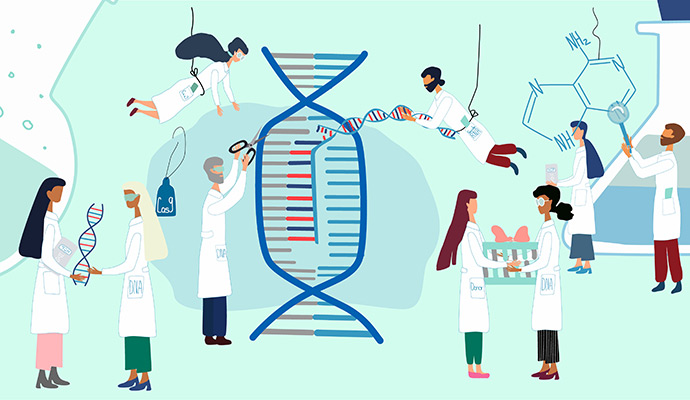Mount Sinai Develops CRISPR Technology to Advance Cancer Treatment
The CRISPR technology, Perturb-map, uses a genetic barcode to mark cancer cells with different gene modifications and image the cancer cells and neighboring cancer cells within the tissue.

Source: Getty Images
- Mount Sinai scientists recently developed CRISPR technology to link genes to complex tumor characteristics at a scale and resolution not previously possible.
Perturb-map CRISPR technology uses a novel genetic barcode system to mark cancer cells with different gene modifications and image the cancer cells, and neighboring cancer cells, within the tissue. Researchers have already identified specific genes controlling lung tumor growth, immune composition, and response to immunotherapy.
Using Perturb-map, scientists hit on two key pathways that significantly affect tumor growth, tumor architecture, and immune cell recruitment. They found that cytokine interferon-gamma (IFNg) controlled one pathway and tumor growth factor-beta receptor (TGFbR) controlled another.
Additionally, scientists found that lung tumors became larger and more abundant when the TGFbR2 gene or a gene coding for SOC1, a regulator of IFNg, was deleted from the cancer cells.
The platform revealed that T cells highly infiltrate SOCS1 tumors, while TGFbR tumors excluded T cells. Scientists highlighted this important finding, as patients whose tumors contain fewer immune cells respond worse to immunotherapy drugs.
"These findings indicate that these genes' effects over the tumor ecosystem are extremely localized," Brian Brown, PhD, senior author, director of the Icahn Genomics Institute, and associate director of the Lipschultz Precision Immunology Institute (PrIISM) at Mount Sinai, said in the announcement.
"If specific gene mutations are keeping T cells out of a subclonal region, this can serve as a pocket of resistance to immunotherapies. Many other genes' local and distal effects on tumor composition are still unknown, but the Perturb-map platform will now give scientists a powerful means to tackle the problem," Brown continued.
Drugs that target the non-cancer cells in the tumor, including immunotherapies such as Keytruda and Tecentriq, have revolutionized cancer treatment over the past two decades. These drugs turn on immune cells in the tumor and enable them to kill cancer cells.
Scientists have also leveraged gene-editing technology CRISPR to knock out genes in cancer cells and study their function. CRISPR technology simplifies disrupting a targeted gene or inserting a new sequence at a specific location using a DNA template.
CRISPR has already helped many chronic conditions, including cancer, blood diseases, HIV/AIDS, Huntington's disease, muscular dystrophy, and cystic fibrosis. But these treatments are in early-stage clinical trials and are therefore likely years away from gaining FDA approval.
